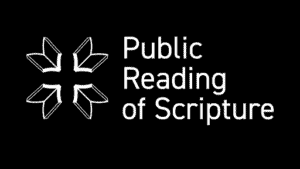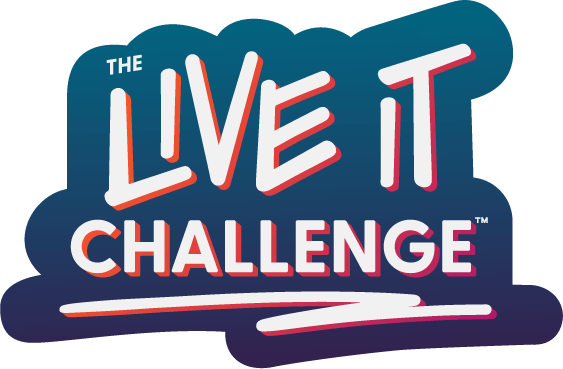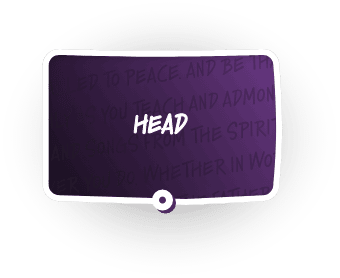The Bible is packed with historical accounts and instructions on how to live in a way that is pleasing and honoring to God. Reading the Bible is an incredible way to grow and deepen our faith. But with so much to read, do you sometimes wonder where to start reading the Bible? Let’s look at why reading the Bible is essential and then explore how to gain wisdom from God’s Word. Then it’s your turn: Pick a reading plan to start this month!
Why Study the Bible?
When you accepted Jesus Christ into your life, you stepped into the most amazing relationship you will ever have — a relationship with God. All relationships require work for them to strengthen and grow. But how can you cultivate a relationship with the Creator of the Universe?
The key to any relationship — including one with God — is communication. First, you can talk to God through prayer. Remember that communication isn’t a one-way street; God wants to speak to you too! Make sure to take the time to listen for His voice. He will choose many ways to talk to you. However, one of the best ways to hear God’s voice is to read His love letter to you: The Bible. Reading God’s Word helps us to grow in Christ. It teaches us how to live a life that is holy and pleasing to Him and that will demonstrate His power and love to those around us. The Bible shows us God’s character and gives us guidance on handling situations in life. We can test everything against His Word and know it is true — yesterday, today, and tomorrow.
Want to dig deeper? Click here for eight reasons to study the Bible.
How Can We Trust What The Bible Says?
The Bible was written over the course of almost two millennia by approximately forty different authors. Paul states in 2 Timothy 3:16 that “all Scripture is breathed out by God,” which means His Spirit inspired every word written.
There are a lot of hot debates on whether or not the Bible is true historically, if it is the Word of God, or if it depicts Jesus accurately. A lot of people demand proof. So how can we know that the Bible is true? Can we trust that it’s accurate? Or do we just take it on faith that it is? Click here to discover five reasons why the Bible is true.
If your friends have questions about the authenticity of the Bible, here are some answers to commonly asked questions about God’s Word that may help you share your faith with them.
Step 1: Pick a Bible Reading Plan That Works for You
Now that we know why it’s important to study the Bible, and that we can trust that it’s true, let’s take a look at where to start reading the Bible!
A few tips for your Bible reading:
1) Set aside time each day to read the Bible. If you have to, block out space on your calendar so that you can’t fill that time with other commitments. Make that appointment with God a priority and one that you can’t miss.
2) Try to be consistent. If possible, set aside the same time to read the Bible each day. It doesn’t have to be first thing in the morning; it can be anytime.
3) Say a short prayer before you start reading. Ask God to speak to you through the Scripture and give you understanding. James 1:5 says, “If any of you lacks wisdom, let him ask God, who gives generously to all without reproach, and it will be given him.” God will allow things to leap off the page and will help you understand what you are reading if you ask Him for guidance.
4) To dive deeper into how to read the Bible, click here!
Bible Reading Plans
1. Chronological Reading Order
The first Bible reading plan you can choose from is a chronological reading plan. This plan guides you through the stories and events of the Bible in the order in which they happened, not the order in which they were written.
The benefit of choosing a chronological reading order is that you get to see which events happened at the same time, and understand what happened next. All of these events then come together to show the whole picture that points to Jesus Christ.
This reading plan typically takes a year to complete, which gives you some time to dig deeper into each passage of scripture that you read. You can download a list of what passages of scripture to read each day, or there are chronological study Bibles available for you to use.
Click Here to Start a Chronological Reading Plan
2. Read the Bible In a Year
This Bible reading plan guides you through the Bible over the course of one year. Each day, you will read passages from both the Old and New Testaments.
The benefits of going through the Bible at a slower pace like this are that you can spend more time on each passage of Scripture and really dig deeper into what you are reading. Reading both the Old and New Testament at the same time gives a well-rounded picture of how God has worked in history and how everything that happened in the Old Testament points to Jesus’ coming in the New Testament.
Click Here to Start a Year-Long Reading Plan
3. Read the Bible in 90 Days
Are you excited to learn everything that the Bible has to say, but don’t want to take a year to do it? This plan is structured so that you can finish reading the entire Bible in three months.
You’ll need to dedicate at least a thirty minutes every day to finish the plan on time. It’s a lot of reading and is a serious commitment to stay on track. However, it’s a great way to see the entire picture in a short amount of time. The only downside is that you don’t get as much time to dig deeper.
Once you’ve finished this plan, go back and pick out chapters or books to study at greater depth. What things jump out to you when you read them a second time?
Click Here to Start a 90-Day Reading Plan
4. Start-to-Finish
The fourth Bible reading plan you can choose from is a start-to-finish plan. This may be the most straightforward approach to reading the Bible as you start on page one (Genesis) and read straight through to the end (Revelation).
You can go at your own pace with this plan and read as quickly or slowly as you would like. This allows for in-depth studying of passages that speak to you. Some great Bible studies focus on individual books of the Bible and will help you navigate some of the more challenging sections, such as genealogies.
Step 2: Find Someone to Talk to About What You Read
Reading the Bible can be a deeply personal and meaningful experience, but it can also be confusing or challenging at times. When you are figuring out where start reading your Bible, it is important that you have someone to come alongside you. Here are a few reasons why:
Five Reasons to Find Someone to Talk to about your Bible Reading:
1. Clarification
It’s not uncommon to come across passages or concepts in the Bible that are difficult to understand. Having someone to talk to about your reading can help clarify any confusion or questions you may have.
2. Perspective
Different people can bring different perspectives to their reading of the Bible. Having someone to talk to about your reading can help you see things from a new angle and consider different interpretations.
3. Encouragement
Reading the Bible can be an uplifting and inspiring experience, but it can also be tough at times. Having someone to talk to about your reading can provide encouragement and support as you navigate difficult passages or themes.
4. Growth
Sharing your thoughts and insights about your Bible reading with someone else can help you process and reflect on what you’re reading in a deeper way. This can lead to personal growth and a deeper understanding of the Bible.
5. Community
Discussing your Bible reading with others can also help foster a sense of community and connection with others who are also seeking to grow in their faith.
Overall, having someone to talk to about your Bible reading can be a valuable resource for deepening your understanding of the Bible and your faith. Whether you discuss your reading with a small group, a mentor, or a trusted friend, having someone to talk to can enhance your Bible reading experience and help you grow in your relationship with God.
Step 3: Join a Bible Study
Joining a Bible study can be a great way to deepen your understanding of the Bible and grow in your faith, especially when you are learning where to start reading the Bible. If you’re interested in joining a Bible study, here are a few steps to consider:
Five Steps to Joining a Bible Study
1. Decide what you’re looking for
There are many different types of Bible studies available, so it’s important to consider what you’re looking for in a study. Do you want a more in-depth study of a specific book or topic? Are you looking for a more casual, discussion-based group? Knowing what you’re looking for can help you find the right fit.
2. Research your options
Do a little looking around for different types of studies in your area. A great place to start is to check out your church’s website and look for any Bible studies you could join. Can’t find anything on the website? Try talking to your pastor to see if he knows where you can get plugged in.
If you can’t find a study to join, consider making your own with a small group of friends!
3. Contact the group
Once you’ve found a few options that seem like a good fit, reach out to the group to learn more. You can usually find contact information on their website or through a Google search. Consider asking about the format of the study, the commitment level required, and any other questions you may have.
If you’ve decided to make your own Bible study, then be sure to contact each of the members and set up a meeting schedule that works for everyone.
4. Attend a session
Many Bible study groups will allow you to attend a session as a guest to see if it’s a good fit for you. This can be a great opportunity to meet the group and get a feel for the study before committing to a full series.
5. Dive in
If you find a Bible study that you enjoy and feel comfortable with, don’t be afraid to jump in and get involved. Participating in a Bible study can be a great way to grow in your faith and connect with others who are also seeking to deepen their understanding of the Bible.
Joining a Bible study can be a rewarding and enriching experience. By following these steps, you can find a study that’s right for you and start growing in your faith.
Finding New Ways to Engage in Bible Reading
It can be difficult to know where to start reading the Bible, especially with a younger audience. To help with this, we’ve partnered with the Public Reading of Scripture and Adventures in Odyssey to provide you with an awesome new way to read God’s Word!

Public Reading of Scripture Dramatized Bible Reading
Bring God’s word to life by listening to Public Reading of Scripture’s high quality dramatized reading. Listen to the story of God unfold with specialized audio elements to immerse you in what you’re reading. Download the app today!

Adventures in Odyssey 30-Day Scripture Reading Plan
Listen along as Whit, Connie, and Jason from Adventures in Odyssey read to you from God’s Word. Each reading is the perfect length to listen to during a family meal, car ride, or anytime!
Memorize Bible Verses With Your Family
Another great way to read the Bible and reinforce what you are learning is to memorize Bible verses from the passages you read. And what better way is there to do that than to get your family involved too! Check out this article below for some tips on scripture memory, as well as a list of verses to memorize!

Equipping the Sword of the Spirit: A Guide to Scripture Memory
The Bible is described as the Sword of the Spirit, a living and active weapon used to fight against sin and help us grow closer to God. Here’s how we can equip it for the spiritual battles we face each day!














